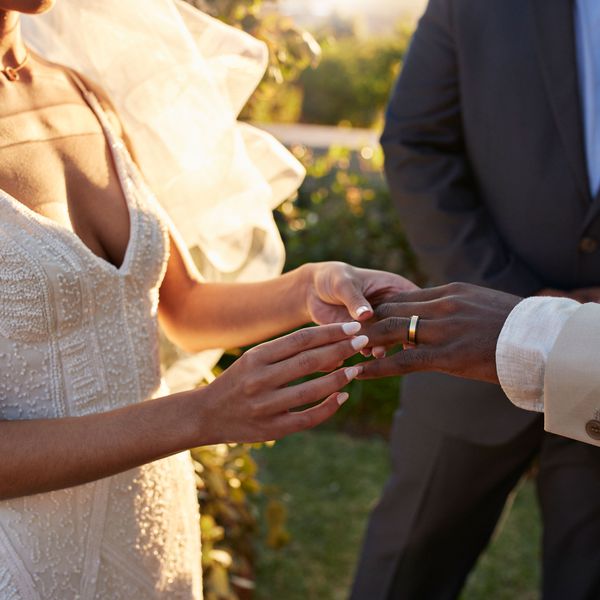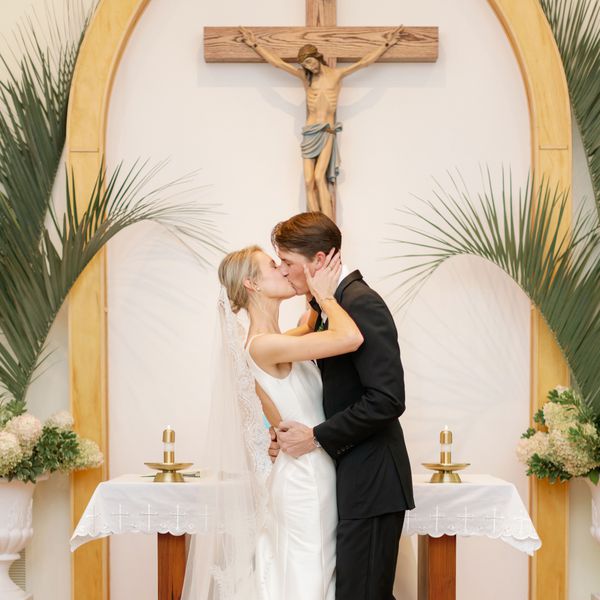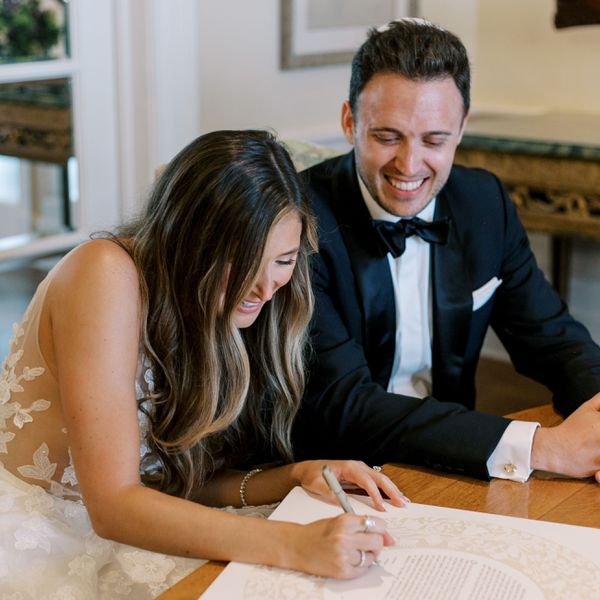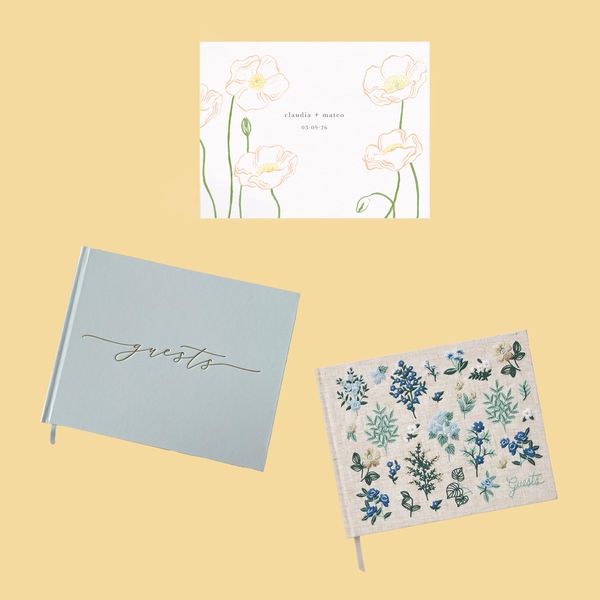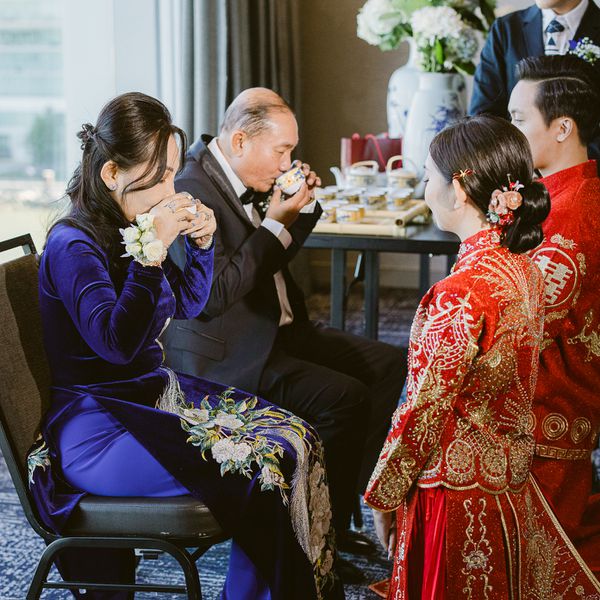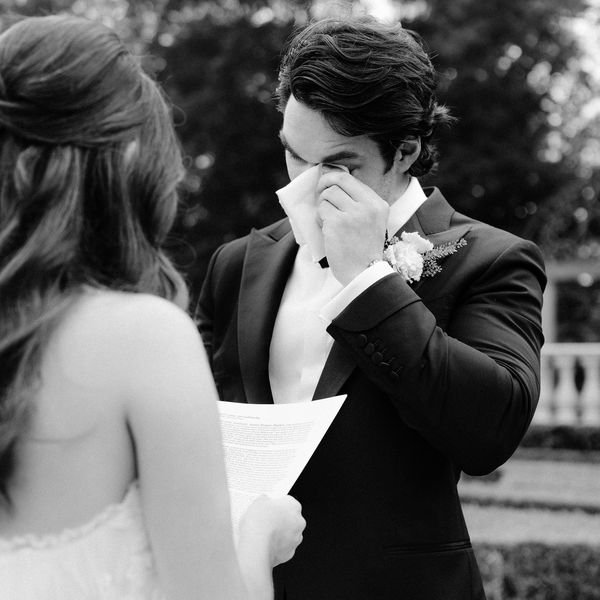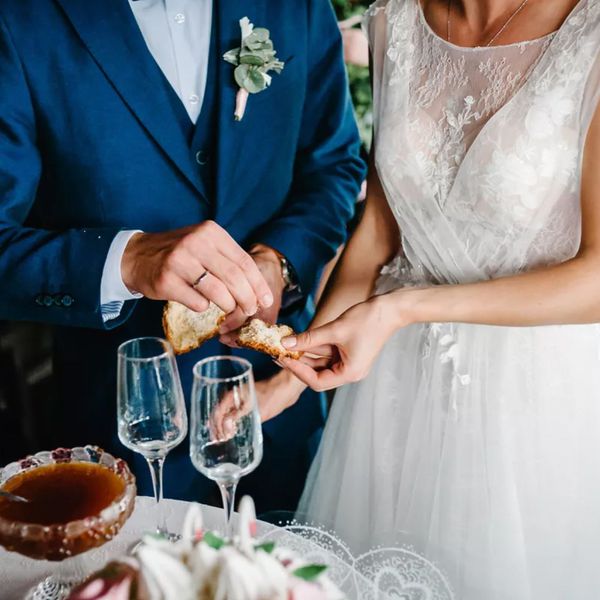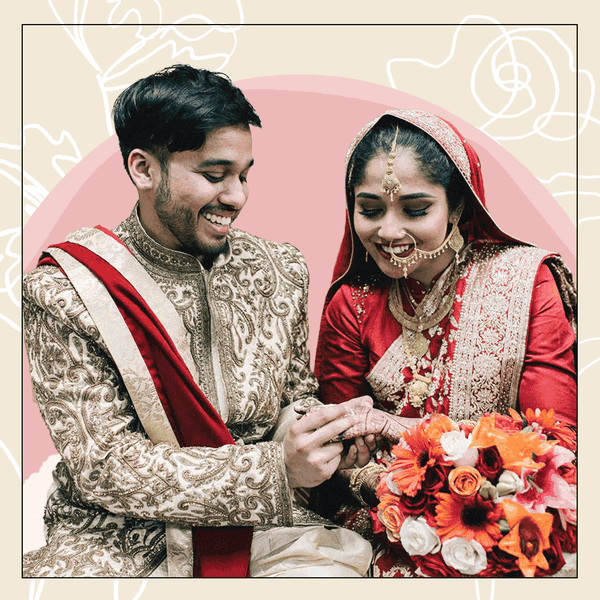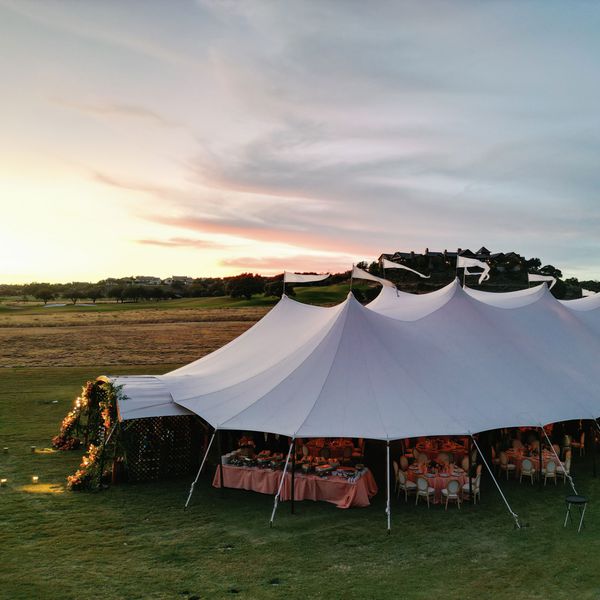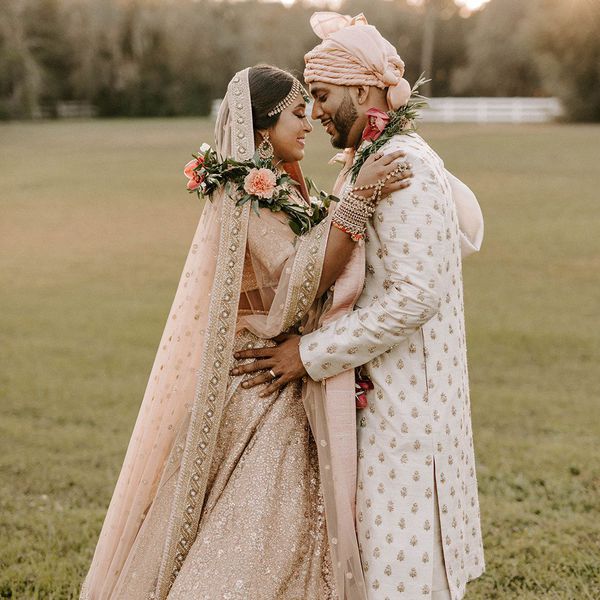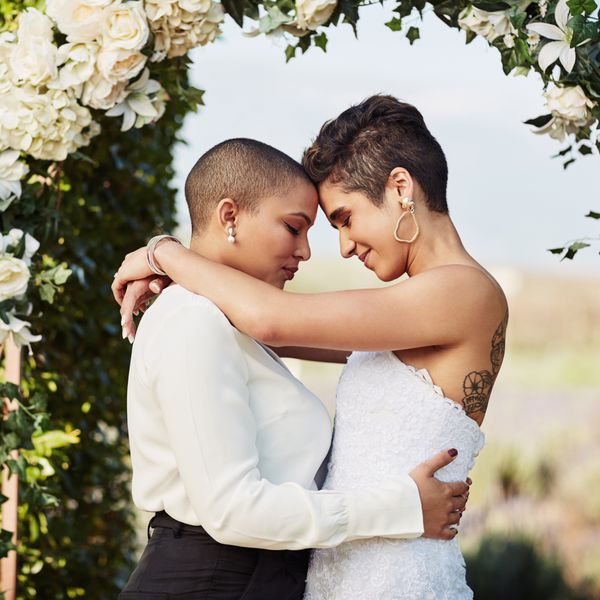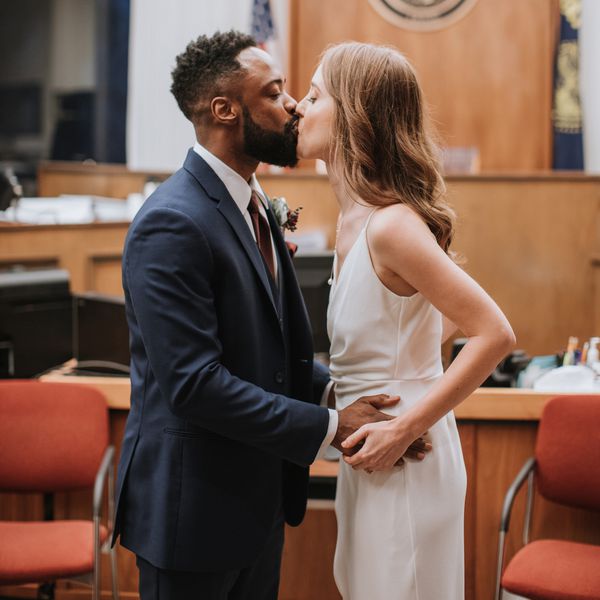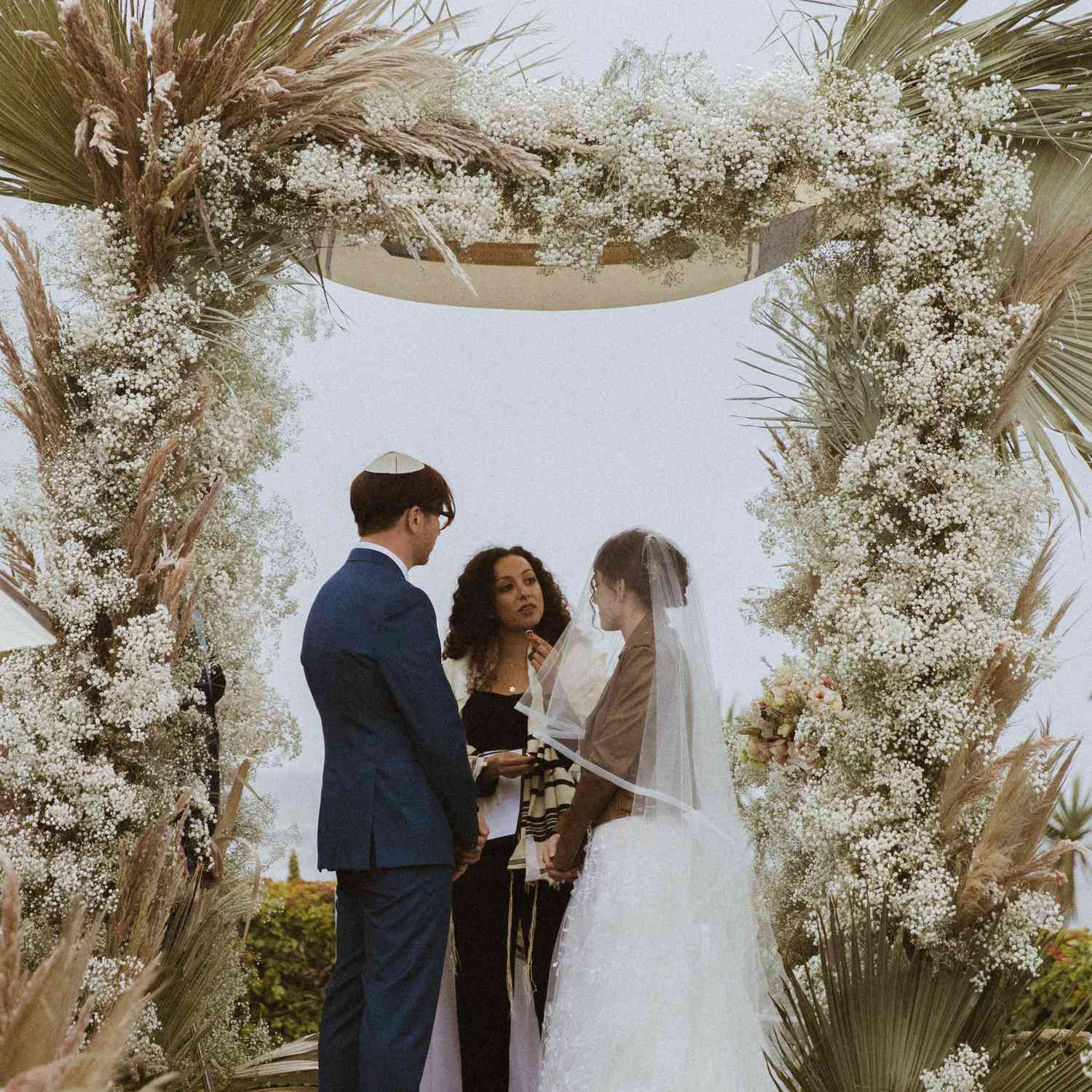
PHOTO BY ANNA JONES PHOTOGRAPHY
The seven blessings, or Sheva Brachot as they are called in Hebrew, are the heart of the Jewish wedding ceremony. Seven different blessings are bestowed upon the couple when they are standing under the chuppah. They may be given by the officiant, the rabbi or the cantor, or friends and family members. Many couples recite English translations or alternative blessings in addition to the Hebrew text.
Meet the Expert
Karen Cinnamon is the founder and editor of Smashing The Glass, the world’s largest Jewish wedding platform.
The seven blessings are repeated again at the wedding reception and then once a day for the next seven nights. Loved ones often host meals or gatherings (traditionally, there are seven of them!) in the couple's honor, also called the Sheva Brachot, where the blessings are recited again. This is a way for the community to continue to celebrate with the newlyweds and sanctify their marriage. Ahead, Karen Cinnamon, the founder and editor of Smashing The Glass, one of the world's leading Jewish wedding platforms, shares everything you need to know about this poignant tradition.
What Are the Seven Blessings (Sheva Brachot)?
The seven blessings (or Sheva Brachot in Hebrew) are recited over a couple at their wedding ceremony and seven days to follow. Some couples use the traditional text while others write alternative, modern versions. From Hebrew, they translate as follows:
- Blessed are you, Lord our God, Ruler of the Universe, who creates the fruit of the vine.
- Blessed are you, Lord our God, Ruler of the Universe, who created everything for His glory.
- Blessed are you, Lord our God, Ruler of the Universe, who created humanity.
- Blessed are you, Lord our God, Ruler of the Universe, who created humanity in His image, in the image of the likeness of his form, and made for them an everlasting establishment. Blessed are you, Lord, who created humanity.
- May the barren one (Jerusalem) rejoice greatly and delight in the ingathering of her children within her in joy. Blessed are you Lord who causes Zion to rejoice with her children.
- The loving partners shall rejoice as You caused your creatures to delight in the Garden of Eden of old. Blessed are you Lord who causes the groom and bride to rejoice.
- Blessed are you, Lord our God, Ruler of the Universe, who creates happiness and joy, groom and bride. Exultation, delight, amusement, and pleasure, love and brotherhood, peace and friendship. Soon, Lord our God, may the sound of happiness and the sound of joy and the voice of the groom and the voice of the bride be heard in the cities of Judah and the streets of Jerusalem—the rejoicing of groom from their chuppahs and youths from their singing banquets. Blessed are you Lord who makes the groom rejoice with the bride.
The History and Meaning of the Seven Blessings (Sheva Brachot)
The tradition of celebrating a marriage for seven days dates back to biblical times. In fact, scholars discussed the idea in the Talmud, a book of Jewish law written in the second century C.E. The blessings recited over the couple also come from ancient rabbinic teachings and express joy and hope for the new union.
Brides and grooms are adding modern twists to this tradition. Many request the blessings be recited in both Hebrew and English during their ceremony. Some opt for alternative translations or ask people they love to write unique blessings for them. It’s also a new custom for the bride and groom to ask friends and family members to recite the blessings during their ceremony, rather than leave it to the rabbi or officiant. “One thing we are seeing a lot of is couples using the Sheva Brachot as an opportunity to honor special guests,” says Cinnamon.
While religious couples tend to have Sheva Brachot meals for seven days after their weddings, more modern couples skip it for their honeymoon.
Including the Seven Blessings (Sheva Brachot) in Your Ceremony
Whether you are taking the traditional approach or adapting the Sheva Brachot to suit your relationship, here's what you need to know about including these blessings in your ceremony.
Understand the Timing
The Sheva Brachot are first recited under the chuppah (the wedding canopy) during the ceremony. At more traditional weddings they are recited again after the meal at the reception, as well.
Pick Your Readers
“The blessings are often recited by a rabbi or cantor, but they don’t have to be,” says Cinnamon. “Couples can ask honored guests to join in the recitation of the blessings.” If you are asking someone to recite the blessing in Hebrew, make sure they are fluent in the language. If not, you can ask them to read an English translation.
Prepare to Say Them in Two Locations (If You'd Like)
The seven blessings are recited twice during a Jewish wedding: once when the couple is standing under the wedding canopy and again during the blessings after the meal. The latter can take place in the reception hall or wherever the meal was served.
Gather What You'll Need
The blessings are usually chanted over a cup of wine, from which the couple then drinks. Make sure there is one present under the chuppah and next to the couple when grace is being said. It’s also important to determine early who is going to recite the seven blessings. Prepare honorees and let them know exactly when to approach the chuppah.
How to Make the Seven Blessings (Sheva Brachot) Your Own
You can opt for modern interpretations, recite the blessings entirely in English, write your own, and ask anyone you love to recite them—the choice is yours.
Skip the Hebrew
It’s tradition to recite the blessings in Hebrew, but many couples also choose to have them read in English, as well. Modern couples even have loved ones write their own blessings for the couple and recite those in place of or in addition to the traditional Hebrew blessings. “This is a nice way to make sure guests who don’t know Hebrew are included,” explains Cinnamon.
Write Your Own
Writing your personal iteration of the seven blessings is a nice, personal touch for your Jewish wedding ceremony—or you can ask friends or family members to write their own and share them with you during the service. There are also alternative versions that are easy to find on the internet.
Planning the Sheva Brachot Meals
Technically, there are seven Sheva Brachot meals to correspond with the seven blessings—they are basically festive, sit-down dinner parties that are held the week after the wedding to continue the celebration (in some cultures, they are held the week before a couple's nuptials).
Identify the Planner
“Anyone who wants to help celebrate the couple can plan one, though they’ll need to coordinate with them,” shares Cinnamon. “Anyone interested in holding a Sheva Brachot should try to be in touch with the couple early on once they’ve set their wedding date, so they can claim a night, as well as coordinate the guest list.”
Choose the Guests
“Traditionally, for the Sheva Brachot meals, there should be a minimum of 10 guests including at least one person who did not attend the wedding or one of the previous Sheva Brachot,” says Cinnamon. There is no limit to how many people can attend, but remember, this is not another wedding. Because the couple might be going to seven of these meals, consider keeping it small and intimate.
Know What to Serve
“The meal can consist of just about anything, as long as it includes bread,” notes Cinnamon. “Ideally it should be something special that the couple will enjoy. Hosts can opt to hold the meal in their home or at a restaurant or synagogue.”
Number of Meals
Seven meals may be part of this tradition, but they aren't a requirement—you can absolutely pare that number down (or skip this element entirely). “Sheva Brachot meals are not required by Jewish law, and it’s perfectly acceptable to opt for one or two rather than the full seven,” says Cinnamon.


